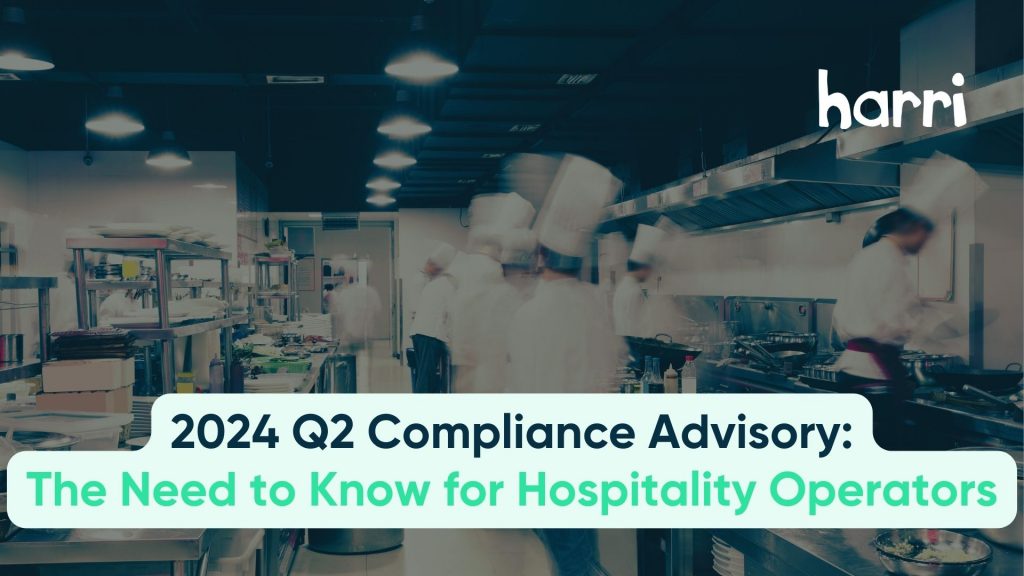Essential Updates on Labor Regulations: Q2 Harri Compliance Advisory

- By Harri Insider Team | May 29, 2024
NLRB Joint Employer
District Court Overturns NLRB’s New Joint-Employer Standard; Faces Legislative Challenges
The National Labor Relations Board (NLRB) established a new standard for joint-employer status under the National Labor Relations Act on October 26, 2023, which broadened criteria to include shared decision-making over essential employment terms like wages and hours. This standard contrasted sharply with the 2020 requirement for “substantial direct and immediate control” over these terms. However, this rule was enjoined from going into effect by the U.S. District Court for the Eastern District of Texas on March 8, 2024, reverting the definition of joint-employer to the 2020 standards due to concerns over excessive breadth in defining employer relationships.
Congress passed a resolution in April to repeal the NLRB’s rule. However, President Joe Biden vetoed H.J. 98 on May 5, 2024. Although the House could not garner the votes necessary to overturn the President’s veto, the NLRB has filed a notice of appeal of the Texas federal district court decision to the U.S. Circuit Court of Appeals for the Fifth Circuit. The ongoing legislative conflict is particularly significant for the fast food industry, where the definition of joint-employer status affects franchise relationships and can drastically influence labor practices and costs.
DOL White Collar Exemption
Preparing For The New DOL Overtime Rule
The Department of Labor published its final rule on April 26, 2024, which updates and revises the Fair Labor Standards Act regulations concerning the exemptions from minimum wage and overtime pay requirements for executive, administrative, professional, and computer employees. The rule is set to take effect on July 1, 2024, where the salary threshold necessary to qualify for the administrative, executive, professional, and/or computer employee overtime exemptions will increase to the equivalent of an annual salary of $43,888. This salary threshold will increase again on January 1, 2025 to $58,656. This final rule also raises the highly compensated employee total annual compensation threshold to $151,164. The rule introduces a mechanism for future updates to the salary and compensation. As such, the salary and compensation thresholds for white collar and highly compensated exemptions will increase on July 1, 2027, and every three years thereafter.
Employers may use the existing timekeeping functionality within TeamLive to track the hours worked of non-exempt salaried employees and calculate any overtime owed. In order to do so, employers should have non-exempt salaried employees clock-in and clock-out for all scheduled shifts. During weekly timesheet review, confirm the total number of hours worked by the non-exempt salaried employee in the hours worked column. Any hours worked beyond 40 hours within the applicable workweek are owed overtime at 1.5x the employee’s regular rate of pay.
Please note: Due to system limitations, the Overtime column within the timesheet will not populate for salaried employees. To calculate overtime accurately, employers must use the hours worked column to properly assess if any overtime is due to a non-exempt employee.

California
California’s Fast Food Council Holds Inaugural Meeting: Setting The Stage For Industry Change
California’s new Fast Food Council held its inaugural meeting on March 15, 2024.
During its inaugural meeting, the council laid out its primary agenda for the coming year, which includes:
- Conducting comprehensive reviews of wage structures and working conditions in the fast-food industry.
- Establishing clear and enforceable standards that promote fair treatment and equitable wages.
- Encouraging open discussions between employers and employees to address ongoing issues and develop practical solutions.
As the Fast Food Council implements new regulations, we will closely monitor these developments to ensure continued compliance. We are committed to promptly adjusting our platform to meet any new requirements set forth by the council.
Assembly Bill No. 610: New Exemptions In California’s Fast Food Industry
On March 25, 2024, California Governor Gavin Newsom approved Assembly Bill No. 610, bringing significant amendments to the existing labor regulations governing the fast food industry under the Fast Food Council’s oversight.
The bill introduces additional exemptions to the definition of “fast food restaurant,” specifically excluding restaurants within airports, hotels, event centers, theme parks, museums, and certain other locations. The new exemptions are designed to distinguish fast food operations that are integral to larger businesses or attractions, which have different dynamics than traditional fast food outlets.
These changes aim to ensure that the Fast Food Council’s regulations are applied more judiciously, focusing on establishments that are purely fast food entities. Businesses affected by this bill are advised to review their operations against the new definitions to ensure compliance with applicable labor laws.
Colorado
Colorado’s New Job Application Fairness Act
Colorado recently passed the “Job Application Fairness Act,” effective July 1, 2024. This act prohibits employers from asking job applicants to disclose their age, date of birth, or graduation dates on initial job applications. The legislation covers all employers operating within the state, including private businesses, industries, and governmental units.
Employers can still request documents like certifications or transcripts, which might include age-related information, but they must inform applicants that they can redact any age identifiers from these documents.
Our Talent Acquisition software has been updated to align with Colorado’s legislative changes, ensuring employers comply with the new requirements. Starting July 1, 2024, the system will no longer allow employers in Colorado to request birth dates or education-related graduation dates in job applications. Employers should review and modify their existing job application forms and processes to eliminate these fields, ensuring their hiring practices fully comply with the Act.
Florida
Understanding Florida’s New Regulations On Youth Employment
Florida has recently passed a significant update to its labor laws concerning the employment of minors. FL H.B. 49, effective from July 1, 2024, revises existing restrictions to create more flexibility for young workers in the state.
The changes are tailored explicitly to minors aged 15 to 17:
- Work Hours Adjusted: For minors aged 15 or younger, employment is restricted before 7 a.m. and after 7 p.m. on school nights to ensure that work does not interfere with their school responsibilities. During school vacations, these minors can work until 9 p.m. Other previously existing restrictions on work times for 16 and 17-year-olds have been removed.
Hourly Restrictions: The law limits how long minors can work during school weeks—no more than 15 hours a week for those 15 and under and up to 30 hours a week for 16—and 17-year-olds. Other previously existing restrictions on work hours for 16 and 17-year-olds have been removed.
Meal Breaks: The legislation mandates that minors aged 15 or younger cannot work for more than 4 hours continuously without a 30-minute meal break; periods less than 30 minutes do not interrupt continuous work. Minors aged 16 and 17 working 8 or more hours a day must also receive a 30-minute meal break for every 4 hours of continuous work.
Exceptions and Waivers:
- Education Flexibility: The rules offer exceptions for minors who are high school graduates or are part of an approved home education or virtual instruction program.
Parental and Educational Waivers: Parents and school superintendents can waive certain restrictions to accommodate individual circumstances.
In light of the new legislation, our existing TeamLive functionalities are well-prepared to help employers across Florida adapt to these standardized employment regulations. Employers may build age-specific minor rules at the Parent level within TeamLive settings to comply with FL HB 49. Once established, these rules can automatically be applied to each unit-level restaurant, ensuring consistency across various locations in adherence to FL HB 49.
New Florida Legislation Restricts Local Employment Regulations
FL HB 433, effective July 1, 2024, ensures that local political subdivisions, such as cities and counties, cannot set their minimum wage standards apart from the state or federal minimum.
Moreover, the law extends its reach to other areas of employment regulation:
- Scheduling Practices: Local governments will no longer have the authority to regulate how private employers schedule their employees. This includes predictive scheduling laws, which mandate advance notice to workers about their shifts.
Heat Exposure Requirements: The legislation also specifies that local jurisdictions cannot mandate specific heat exposure standards for workplaces beyond what is already required by state or federal law. This includes standards for monitoring employee heat exposure, water consumption, cooling measures, and related training programs.
As the law takes effect, employers and employees in Florida should stay informed about their rights and obligations under the new statewide standards.
Indiana
Key Changes In Youth Employment Laws With HB 1093
With the passage of HB 1093, effective January 1, 2025, Indiana introduces significant amendments to its labor and safety codes concerning youth employment. The new legislation adjusts the existing statutes to provide more structured and safe working environments for minors. Key changes include:
- Employment Exemptions: The Act specifies situations where certain labor laws do not apply, such as for parents employing their children, minors enrolled in work-based learning courses, and minors working as actors, performers, or newspaper carriers.
- Work Hour Restrictions: Minors aged 14 and 15 are not allowed to work before 7 a.m. or after 7 p.m., although they may work until 9 p.m. from June 1 through Labor Day. Additionally, these minors are restricted to working no more than 3 hours on a school day, 18 hours in a school week, 8 hours on a non-school day, and 40 hours in a non-school week. The new legislation repeals the previous sections that imposed specific work hours and time restrictions on minors aged 16 and 17, effectively removing those restrictions and allowing them to work similar hours to adults without the limitations previously imposed.
- Protections in Hazardous Occupations: Additional safeguards are implemented to prevent minors from working in hazardous conditions unless specific criteria are met, focusing on safety first.
For employers, these changes mean reevaluating how they hire and schedule minor employees to comply with the new regulations. There is an emphasis on adhering to the work hour limits and ensuring that minors are employed in safe, non-hazardous environments. Employers may build age-specific minor rules at the Parent level within TeamLive settings to comply with HB 1093. Once established, these rules can be applied automatically to each unit-level restaurant, ensuring consistency across various locations in adherence to HB 1093.
New York
New York’s Landmark Legislation: Mandating Paid Nursing Breaks for Employees
On April 20th, 2024, New York legislators passed significant New York Labor Law amendments as part of the state’s 2024-2025 budget approval (S08306). Under the new law, effective June 19, 2024, all employers in New York, regardless of their size, must provide paid nursing breaks. This new mandate updates the prior requirement that only reasonable unpaid breaks were offered for employees to express breast milk.
The amended law stipulates that employers must provide a 30-minute paid break each time an employee needs to express breast milk. Employees who need to extend the break beyond 30 minutes can use existing paid breaks and mealtime. This provision is applicable for up to three years following childbirth, consistent with the duration under the former law.
To activate Lactation Breaks in TeamLive, navigate to the Breaks tab within TeamLive settings. At the bottom of the page, activate Allow employees to start Lactation Breaks. Once activated, ensure the break type is Paid.
Lactation break periods must be added to an individual employee’s profile for them to populate as an available break option when the employee clocks out for their break on TeamHub. To add a lactation break period, navigate to the employee’s profile in CoreHR. Within their profile, select Employment Info. Under Operational Information, select Edit Lactation Break Periods. Within Manage Lactation Break Periods, select Add New Period. Enter the Start date, End date (if applicable), and a Description, then select Save. On the effective date of the defined Lactation Break Period, the employee can clock in and out for their lactation break period. The system will record this break period on their timecard.
New York City Enacts Workers’ Bill Of Rights To Enhance Employment Transparency And Accessibility
New York City has taken a significant step to support and protect its workforce with the passage of Local Law 161 of 2023. Officially enacted at the end of 2023, this law amends the administrative code to include a comprehensive “Workers’ Bill of Rights.”
Starting from July 1, 2024, employers must provide the multilingual “Know Your Rights at Work” poster at each NYC workplace where employees can easily see it. Employers must also ensure a poster copy is provided to each employee by July 1, 2024. After July 1, employers must give new employees a copy of the poster on or before their first day of work. Additionally, if an employer uses digital communication tools regularly, they must make this information available online or through a mobile application.
Employers failing to meet these requirements may face a civil penalty of $500. However, a grace period for first-time violations gives businesses 30 days to correct any oversights without a penalty.
Employers can leverage tools like Document Management or CommsHub to streamline compliance with these new requirements. These tools can efficiently distribute a digital copy of the poster to employees, ensuring that all staff receive this crucial information in a timely manner and in accessible formats.

Oregon
New Oregon Law Expands Predictive Scheduling Exceptions
Oregon’s recently updated employment leave laws bring significant changes that impact both employees and employers, specifically when it comes to managing work schedules around leaves of absence (SB 1515). Effective July 1, 2024, one notable update involves adjusting the scheduling rules for Oregon’s Predictive Work Scheduling Law (ORS 653.455).
Under the amended ORS 653.455, if an employer is given less than 14 days’ notice about an employee’s need for leave—or an employee’s return from leave (related to ORS chapters 657B or 659A), the employer can change the schedule of an employee who was temporarily covering those shifts without incurring schedule change premiums. This change is designed to provide flexibility for employers to manage sudden changes in staffing while still accommodating the important need for employees to take leave for medical or family reasons. Businesses must update their H.R. policies and ensure managers are trained on these new regulations to handle leave requests effectively.
To support employers in implementing these changes, Covered Employers utilizing TeamLive to manage Oregon Fair Workweek will notice a new premium exception option within the premium resolution workflow within the employee timecard. This update is designed to streamline the process of adjusting schedules in compliance with the new rules, ensuring that employers can effectively manage staffing adjustments when employees take or return from leave, as mandated by ORS 653.455, without any administrative hassle.
Utah
Utah Legislators Amend Child Labor Laws to Enhance Protections for Working Minors
The Utah Legislature has passed a series of amendments to Section 34-23 of the state labor laws, which took effect on May 1, 2024 (SB0248). These changes align more closely with the federal Fair Labor Standards Act (FLSA) and clarify the employment conditions for individuals under 18.
Under the revised law, a “minor” is standardized as any individual under the age of 18, unifying previous age categories and definitions to avoid confusion and ensure consistent application of the rules.
The amendments significantly change the working hours permitted for minors, especially those under 16. The new rules state that these young workers cannot be employed during school hours unless specifically authorized by school authorities and set strict limits on working hours outside school time. Minors under 16 are prohibited from working more than three hours on a school day and 18 hours in a school week. Their work is restricted to the hours between 7:00 a.m. and 7:00 p.m., except from June 1 to Labor Day, when they are allowed to work until 9:00 p.m. to accommodate the longer daylight hours of summer. On non-school days, these minors can work up to eight hours but are not permitted to work more than 40 hours in a full calendar week.
Washington
Three New Local Minimum Wage Laws
Three new local jurisdictions in Washington—Bellingham, Burien, and Renton—have adopted minimum wage laws, reflecting a proactive effort to address economic disparities and support lower-income workers. Renton not only adjusts the minimum wage but also introduces an Access to Hours rule, which mandates that employers offer additional hours to existing part-time employees before hiring new staff.
- Bellingham: Effective May 1, 2024, the city minimum wage shall be set at $1.00 above the applicable Washington State minimum wage set under Chapter 49.46 RCW.
- Burien: Effective July 1, 2024, the city minimum wage shall be $3.00 above the state minimum wage rate.
- Renton: Effective January 1, 2025, large employers will match Tukwila’s rate, and other employers will pay $2 less, alongside a mandate to offer additional hours to part-time employees before hiring new staff.
Employers may set the appropriate minimum wage by navigating to the General tab within TeamLive settings. Under General, employers will find the Minimum Wage setting. This setting may be configured to the exact minimum wage rate for their jurisdiction, or at a higher applicable rate.
To facilitate compliance with Renton’s Access to Hours rules, employers can take advantage of the available shifts email service, which automatically notifies employees at the start of each day about shifts that are available for pickup. Additionally, employees can conveniently view and claim open shifts using the Available Shifts Pool feature within the TeamLive mobile app.
Harri: Your Partner in Compliance
As employment regulations continue to evolve, Harri stands by your side, ready to assist in managing these changes. Recognized for our expertise in employer technology solutions, we focus on equipping clients with the necessary tools and insights to stay compliant. Harri enables you to create transparent and equitable workplaces, staying informed and ahead of regulatory shifts. Choose Harri as your partner in compliance, ensuring your business remains competitive and prepared for future challenges and opportunities.





















